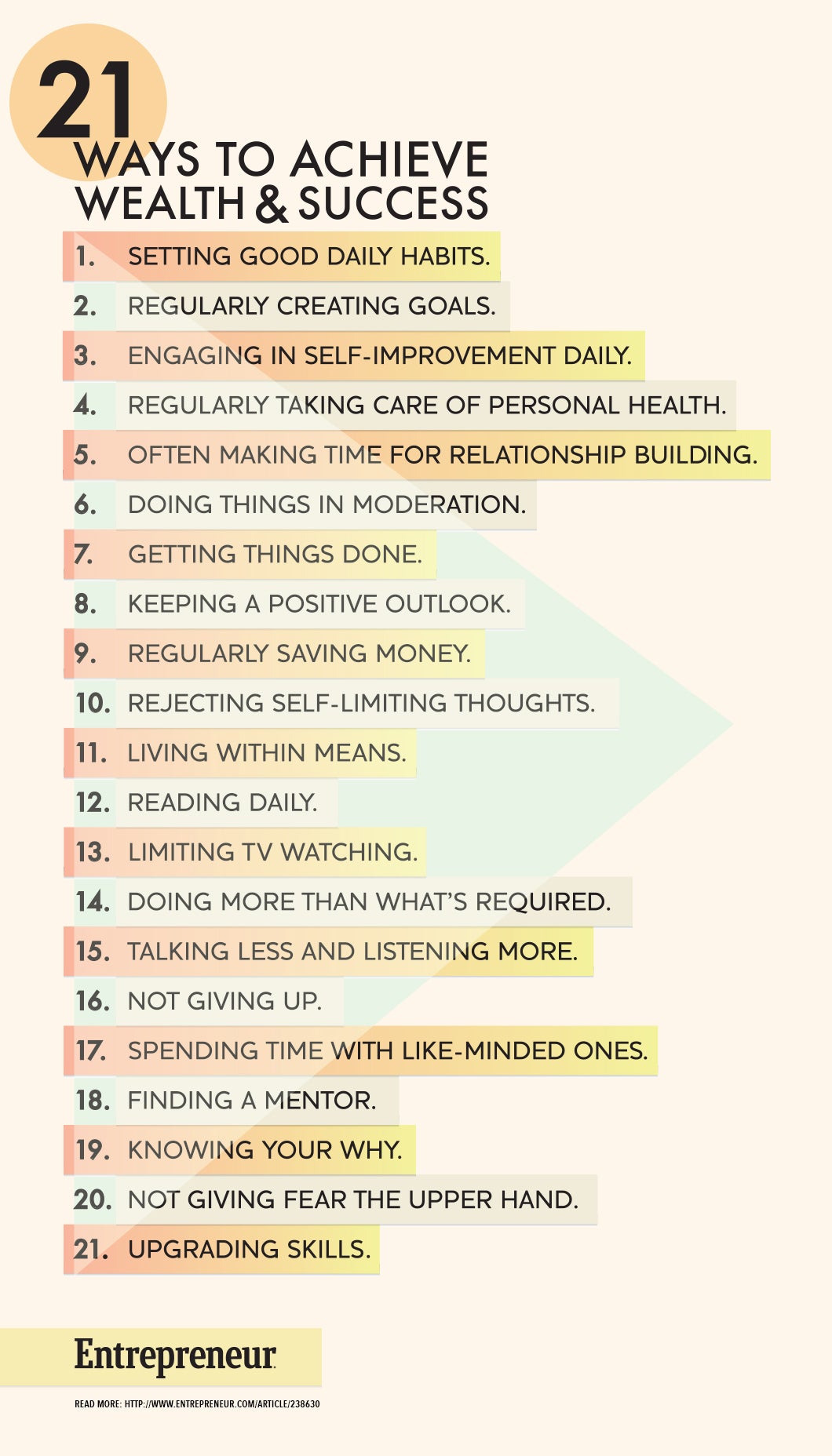In his book, Rich Habits — The Daily Success Habits of Wealthy Individuals, Tom Corley outlines several habits that distinguish the wealthy from the nonwealthy.
It got me to think, How many people operate on autopilot and don’t stop to monitor their everyday patterns? Below I’ve summarized 19 of his habits for success (nine culled from his book and the next 10 from his recent article in Success) plus two of my own. If you’re not actively engaged in these 21 things, you are, in effect, leaving money on the table.
Related: Conquer Stress and Master Sleep for a Richer Life
1. Setting good daily habits.
Good habits are the foundation of wealth building. The difference between successful and unsuccessful people lies in their daily habits. Simply put, successful people have many good habits and few bad ones. If you understand that your bad habits may be preventing you from becoming wealthy, that realization will be the first step in your improving your circumstances.
In his book, Corley invites you to take out a sheet of paper and list your bad habits in one column and then invert each one to place under a new column for good habits. It should look like this:
Bad Habit/Good Habit
I watch too much TV. I limit myself to one hour of TV per day.
I don’t remember names. I write down names and remember them.
Then for 30 days, follow the guidance of your new good habits list. You’ll be amazed at how much you can accomplish.
2. Regularly creating goals.
Successful people are goal driven. They create goals all the time. They plan their day the night before with to-do lists.
People who are headed for success think for the long term. They have daily, weekly, monthly and yearly goals. But what’s a goal without a plan to reach them? So not only do successful people have goals, they also come up with ways to achieve them and hold themselves accountable.
3. Engaging in self-improvement daily.
Successful people are always looking for ways to improve themselves. They read every day and are students of their profession. They don’t spend their time on activities that don’t bring them closer to their goals.
I recently attended an event hosted by author Brendon Burchard, who said he consistently blocks out time to create. Successful people like Burchard know that time is too valuable a commodity to waste. They spend their time on the things that will move the needle for them in their business: Being committed to self-improvement means you engage in activities every day that will stretch you.
Seek ways to expand your knowledge. This won’t always be easy, but people grow from things that pose a challenge. Once your knowledge grows, opportunities appear.
Related: Arianna Huffington’s Recipe for Success: Unplug, Renew and Recharge.
4. Regularly taking care of personal health.
Each and every day successful people make an effort to eat right and exercise. Eating right is of utmost importance. Exercising daily can become a regular habit, just like taking a bath. People who exercise routinely have more energy to get things done. How are you doing in this area?
5. Often making time for relationship building.
People who are successful are other-people focused. They take time out of their day to strengthen the bonds of friendship and form long-lasting relationships with others. Networking is something they do all the time. They reach out to their contacts and look for ways to help them with no expectation of in return.
The most beautiful sound on Earth, I once heard someone say, is your name. So make it a goal to learn the names of every contact you meet. Aren’t you impressed when someone remembers your name? I know I am. So stand out as different and start remembering names.
6. Doing things in moderation.
You live in a balanced way if you do activities in moderation. This means having a balanced approach to work, eating, exercise, consuming alcohol, watching television, surfing the Internet and so forth. As a result, people will enjoy your company. If people like being around you, then you will be more apt to collaborate or find the new business partner that you need to take your business to the next level.
Related: How Fortune 500 Leaders Spend Every Minute of the Day (Infographic)
7. Getting things done.
Don’t put off to tomorrow what you can do today: Accomplish things. All people have fears, but successful people push past them. They don’t procrastinate. They get the important things done, no matter the cost.
In Rich Habits, Corley explains that when the thought of putting off something enters the mind, immediately shed notion by saying, “Do it now.” He says repeat these words 100 times if necessary. Just don’t stop till the task is done.
8. Keeping a positive outlook.
Consider the most successful person you know. Is that person positive or negative? Most likely this individual is positive, enthusiastic, energetic and happy. This person chooses to see the good in others and in himself or herself. To this person, problems are just opportunities waiting to be uncovered.
Every day people are bombarded by news of bad deeds and doings. Successful people minimize their exposure to this type of thing and instead opt to fill their minds with positive ideas from books and magazines.
9. Regularly saving money.
According to Corley, successful individuals put away about 10 percent to 20 percent of their gross earnings in a savings, investment or retirement plan. Not everyone can afford to do so, but what percent are you putting away?
Related: 8 Money Mistakes to Avoid on Your Way to Being Wealthy
10. Rejecting self-limiting thoughts.
Successful people command their thoughts and emotions. As soon as bad thoughts intrude, they cast out anything that challenges their ability to succeed at the task at hand. They do not dwell on negative notions. Their self-talk is positive and not overly critical. They replace bad thoughts with good ones.
Because successful people engage in self-improvement daily and are constantly involved in positive things, they don’t allow themselves time to indulge in negative emotions.
11. Living within means.
Wealthy people avoid overspending. Among many of those struggling financially, some are living above their means. They spend more than they earn, live from paycheck to paycheck and are drowning in credit-card debt. If this is you, resolve today to turn things around for you and your family.
12. Reading daily.
Many successful people read 30 minutes or more every day. Reading can increase your knowledge and know-how. When you read, often you are seeking to improve yourself. This automatically sets you apart from your counterparts. You will stand out from the competition.
13. Limiting TV watching.
Did you know that many successful people limit the amount their TV time to one hour or less a day? How much time do you lose in front of the television that you could be spending doing something more productive?
14. Doing more than what’s required.
Successful people regularly go above and beyond the call of duty at work. Even if something is not in their job description, they will volunteer to do it. Wealthy people make themselves invaluable. As an entrepreneur, you may not have a boss. But in what ways do you go above and beyond for your clients? How do you wow them?
Related: Smart Leaders Keep Their Ego in Check and Listen In
15. Talking less and listening more.
When you listen, you learn. And as the adage goes, that’s why people have two ears and one mouth. When you take the time to really pay attention to what another person is saying, it can truly help not only you but your bottom line as well. When you listen, you are in a better position to help others.
16. Not giving up.
Don’t give up when the going gets tough. Successful people hang in there. They pivot. They try something new. They persist. They may have to change their direction, but they keep moving forward.
17. Spending time with like-minded ones.
There’s a saying that goes, “Show me who your friends are and I’ll show you who you are.” I believe that. People are only as successful as those they choose to surround themselves with. Good associations can help you more quickly achieve your goals.
Related: What I Learned From Being a Broke, Unemployed Graduate
18. Finding a mentor.
Many people who have had a mentor have attributed their success to that person. Mentors can help you achieve your goals faster and keep you accountable. They can share valuable experience that can cut your learning time in half.
19. Knowing your why.
When you know why you’re doing something, you will get what you want quicker than if you don’t. Having a purpose is essential to being successful in business and in life. Why do you want to be successful? Why do you really want to be wealthy?
20. Not giving fear the upper hand.
Everyone has fears. Successful people don’t allow their fears to limit or define them. Fear inevitably keeps you in the same position and stunts your growth. Recognize your fears and seek ways to overcome them. Interview someone you admire and ask that person how he or she overcame a fear or pick up an autobiography and take notes.
21. Upgrading skills.
If you want to get ahead, there’s only one way to do it: Become better at something than you are today. What’s the one thing you can focus on for the next 30 days that will catapult you to rock-star status in your industry? Focus your attention on that. I heard John Lee Dumas from Entrepreneur on Fire define “FOCUS” like this: Follow one course until success. Will you?

Related: How Entrepreneurs Can Read to Lead






 Genius is a potential that lives within you and every other human being. You have many moments of genius in your lifetime. These are the times when you have a uniquely brilliant idea and implement it even if only you are aware of how fantastic it is. Perhaps you created something absolutely astonishing and you even amazed yourself. Then there are the moments when you make exactly the right shot in a round of golf or a tennis match and you realize with immense pleasure what you’ve just accomplished. You are a genius.
Genius is a potential that lives within you and every other human being. You have many moments of genius in your lifetime. These are the times when you have a uniquely brilliant idea and implement it even if only you are aware of how fantastic it is. Perhaps you created something absolutely astonishing and you even amazed yourself. Then there are the moments when you make exactly the right shot in a round of golf or a tennis match and you realize with immense pleasure what you’ve just accomplished. You are a genius.






